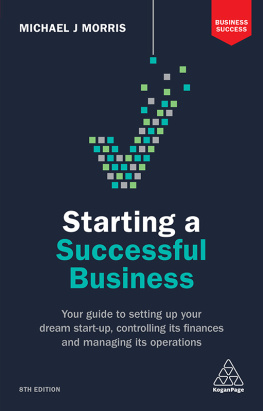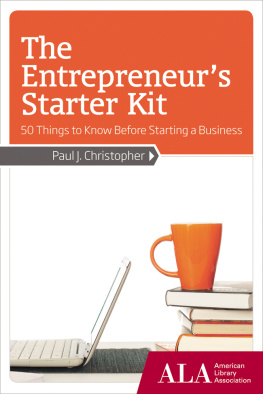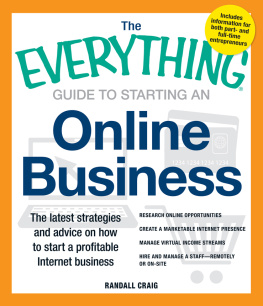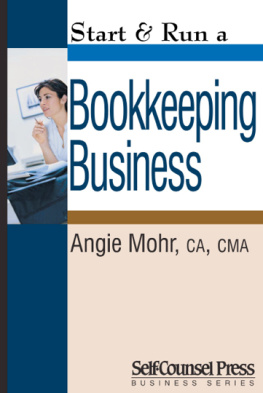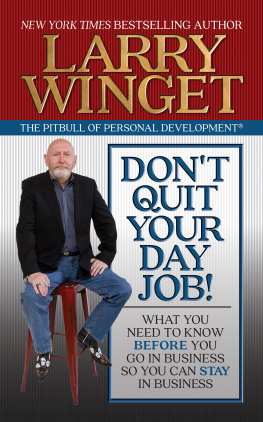two people who have made a difference in my life.
T he numbers are staggering.
Over half (56%) of all Americans dream of starting their own business. The United States is the land of opportunity, but so few of us ever make the leap to this fundamental aspiration. Work is a central part of our lives. Each week for 35 years or moreover 70,000 hours and often half of the time we are awakemost of us work (and travel to and from work). Yet, only a very few of us ever feel that we set our own course, work at what we do best, and are doing what we most love doing. Indeed, in late 2003, the Conference Board reported that U.S. job satisfaction hit a record low: Over half of all Americans are unhappy with their jobs. The Gallup Organization asked 1.7 million employees in 101 companies from 63 countries, At work, do you have the opportunity to do what you do best every day? Only 20% of the responding employees working at large firms answered yes. Finally, a 2004 Gallup poll found that over 70% of U.S. workers are disengaged from their jobs, meaning that almost three of every four workers have mentally checked out and lost any real commitment to their work or their company.
People are unhappy at work, cant use their unique skills, and want greater control of their destiny. Even more important, they feel theyre wasting an important part of their lives. As Bob Fuhrer, a successful entrepreneur and the president of Nextoy, LLC, said, When I was a kid working as a gofer, it was the older guys in the office whom you would always hear saying, I wish that at some point I had tried to make it on my own. I was determined that when I was their age, I would not have this same regret.
When asked, Well, why dont you start your own business? people most often give reasons related to money. People stay at their jobs because theyre worried about not being able to meet existing financial commitments. They believe that they dont have the financial resources required to successfully start their own businesses. These are certainly important and valid issues, but they no longer have to be the driving force in business life.
Today, the conventional wisdom about how to start a substantial business is just plain wrong. Now, you dont need to raise a lot of money first, you dont need a team of employees, and you dont need limitless financial resources. This book details how in todays business environment it is easier, and more possible, than ever to build a significant business on your own with no employees.
An important related issue is the perception of extraordinary high risk generally associated with starting your own venture. In all likelihood, almost all of the 56% of Americans (you or the person sitting next to you) who would like to be their own boss are aware of the high failure rate often cited for start-ups. The generally accepted rule of thumb is that 40% of new businesses die within the first year, and that over 80% of start-ups fail within the first five years. With widely reported odds like that, its no wonder that people with ongoing financial responsibilities stay put.
This book, however, is also about how to dramatically limit the risk of failure associated with any new venture. You can substantially limit that risk. You can both avoid the mistakes that frequently lead to rapid business destruction and learn the steps that successful entrepreneurs take to avoid failures.
You can never completely eliminate risk. Indeed, life is filled with different kinds of risks. The first time we cross the street alone as youngsters, were taught to limit the risk of being hit by a car by looking both ways before we start out. Starting a business is no different: By taking specific steps before you launch a business, you can increase your chances of success dramatically. It is now far easier to ensure that when you go it alone, you successfully cross the street the first time on your own.
Similarly, you can take specific steps to ensure that in this extraordinarily difficult, competitive climate, your business survives and thrives. This book details and demonstrates these ideas and strategies.
Starting your own business still requires hard work, dedication, and perseverance. In todays hypercompetitive environment it is impossible to suggest otherwise. The approach detailed here requires energy, determination, and discipline. But youll hear from successful entrepreneurs here who consistently say that the freedom of working on your own makes it all worthwhile. They also find that this freedom brings them higher energy and greater focus: When youre on your own, you know that youre capturing the full value of your work. If you work hard, youre the one who reaps the rewards. When you accomplish something, you get the financial rewards and you have the satisfaction of knowing that youre the one benefiting from your efforts.
Finally, an important message of this book is that over the past few years, changes in the way businesses work and in supporting technology mean that there has never been a better time to start your own business. This book details how to conceptualize your business and how to focus your energy and efforts so that you can successfully go it alone.
The Power of Individuals
In part, this book is about the tremendous power of each individual. Americans rarely believe that people can accomplish great things in business on their own. As corporations grow ever larger, the conventional wisdom holds that the potential influence of solo entrepreneurs similarly diminishes. But in fact, the opposite can also be true. Individuals are now more powerful than ever.
This new power may not be entirely good: In ancient times, how much damage could any single person inflict on a group of people? With a stone, a stick, or a sword, one person couldnt harm too many others. With the invention of the machine gun and bombs, this power expanded. Today, we are all painfully aware that an individual terrorist could potentially use miniature nuclear weapons or biotechnology to harm large numbers of people. As our society has evolved, technology has empowered the individual.
This same empowerment in business today can have far-reaching effects. It is now possible for individuals, in a positive sense, to be dangerous in business. Oscar Wilde said that an idea that is not dangerous is unworthy of being called an idea at all. This book is filled with ideas about how you can become positively dangerous in the business world when you go it alone.
Who Should Read This Book
This book is for anyone who has ever dreamed of owning his or her own business. Whether you consider that idea a vague yearning, a dream you hope to realize, or a necessity, this books message is for you.
As a society, we have been led astrayto believe that to start a successful business you need to raise a great deal of money, take enormous risks, and recognize that the odds are you will fail anyway. That is just plain wrong, and this book explains why.
This book is for the one of every two Americans who dream of going out on their own, including:
- Current and former corporate executives and employees who are seeking both greater financial rewards and greater control over their lives
- Anyone who has recently lost his or her job as a result of layoffs and is deciding what it makes sense to do next





